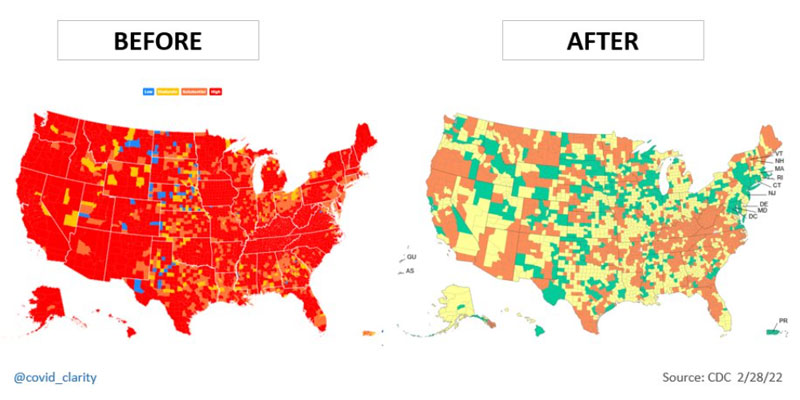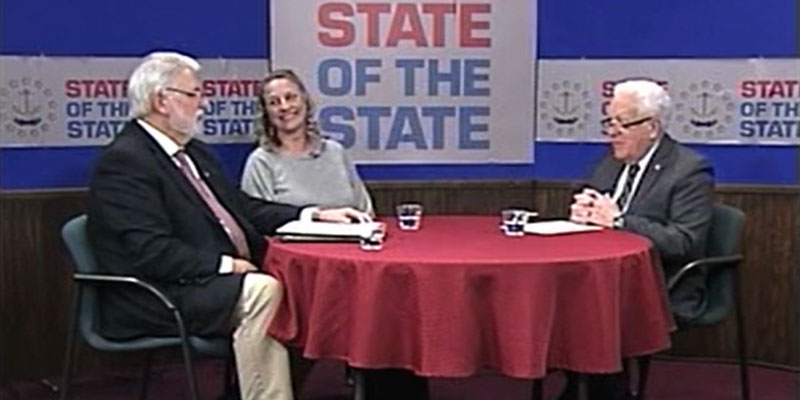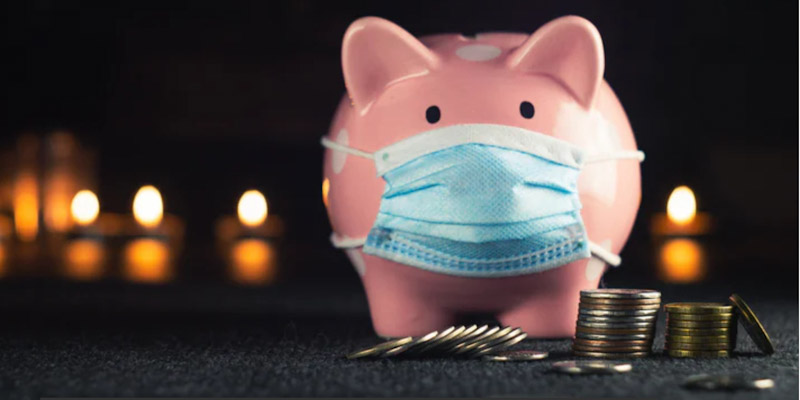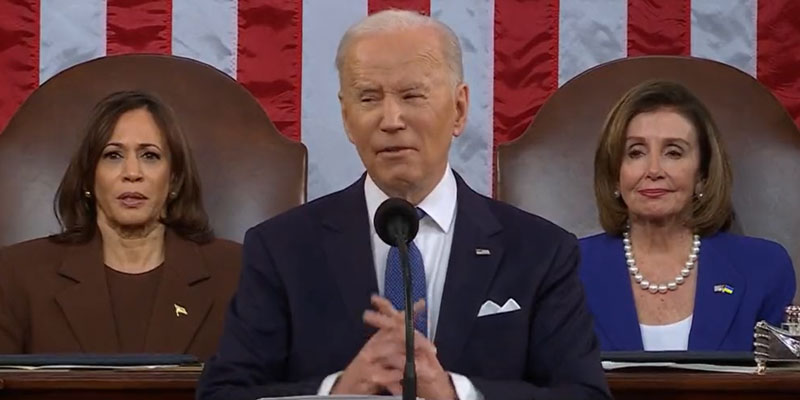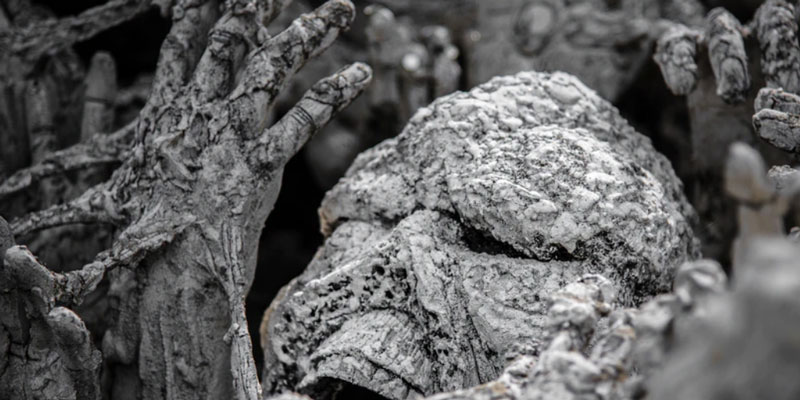It’s depressing to say, but it looks like the anti-reform strategy of the teachers unions and other special interests succeeded. From the beginning, it was clear that the plan was to delay and obfuscate attempts at correcting the unforgivably terrible performance of Providence schools until the attention of the public moved on.
For some reason, it was this tweet from Providence Teachers Union VP Jeremy Sencer that heralded their success:
Last night’s @RISenate hearing made it clear that we can do the TAP work for @pvdschools better without the divisive, chaotic @RIDeptEd takeover. We have the passion & talent in PVD!
If anybody was (1) paying attention, (2) remembered the recent past, and (3) cared, Sencer would have been too concerned about backlash to state such a thing publicly.
[Open full post]Ed Driscoll rounds up a little bit of the commentary, including:
TWITTER THREAD ON 2020 AND ITS AFTERMATH: “The Democrats saw an opportunity with the emergence of Covid to crush a roaring economy under a president they didn’t like. So they, & their base, did everything in their power to impose crushing restrictions on small businesses…Locking people up at home not only tanked the economy & drove up prices, it completely disrupted the global manufacturing & supply chain that was in place. You can’t just flip that on and off like a light switch.”
And:
As Ace of Spades writes, at the start of a lengthy post on that last headline, “The masking mandates that the corrupt US and state and local governments forced on children, under pressure from the corrupt teachers unions have imposed developmental disorders on children that they may never recover from. The early years of development are critical ones. You don’t get those back. These are critical years of development in which children’s brains are wired to rewire themselves like crazy. Their brains will reconfigure themselves during these years like in no other point in their lives, ever. There is no ‘Do Over’ switch on a child’s formative years.”
I suspect the average person would be reluctant to believe people could be evil enough to do this kind of harm knowingly, let alone deliberately. Well, that’s the question, isn’t it?
[Open full post]And just like that, the whole thing’s wished away. Strategies that some of us have been down-throttled, blocked, or even deplatformed for suggesting over the past two years are suddenly the common wisdom of the “experts,” and images of Anthony Fauci are floating around social media with the text, “Have you seen me?”
Since the pandemic started, Fauci has been out there offering the public health establishment’s point of view, even if it was contradictory from week to week. While a quick review of headlines shows he continues to pop up every few days, his appearances have become much less common. One does wonder whether he’s keeping quiet because he disagrees with the softer direction the government has taken or simply because the Biden administration wants people to begin forgetting the ordeal of COVID.
Either way, the approaching election is conspicuous, and the shift in tone feels entirely political — if not to bury dangers for politics’ sake, then to acknowledge that skeptics were right all along without admitting error.
Let’s remember that COVID struck just before an election that Democrats desperately wanted to win (and, therefore, that the news media desperately wanted to win for them). Around April of 2020, Rhode Island shifted its methodology for counting COVID hospitalizations from an attempt to understand who was in the hospital because of COVID to a simple tally of anybody who happened to test positive for COVID while in the hospital. For weeks, we had been told that hospitalizations were the key metric to watch, and suddenly “cases” were the measure.
Now we’re approaching another election, and this time Democrats desperately do not want to lose — or at least to lose everything. COVID is no longer “novel” to Americans, so ramping up the fear as cover for electoral cheating risks massive backlash. The only option, therefore, is to go the other way and try to make people feel more optimistic while enjoying (partisans hope) an economic boost as the last of the COVID restrictions fade.
Maybe it’s a coincidence, but it sure is suspicious to see the CDC shift its approach to tracking COVID in a way that produces the map shown in the featured image of this post. Jon Miltimore, of the Foundation for Economic Education, describes the change thus:
“A community’s COVID 19 level is determined by a combination of three pieces of information,” Massetti explained, “new hospitalizations for COVID 19, current hospital beds occupied by COVID 19 patients or hospital capacity, and new COVID 19 cases.”
By simply changing its formula to include hospitalizations and hospital capacity, the CDC took the vast majority of the US from a state of high community transmission to low or moderate. The color red is also conspicuously absent.
Sorry. I call fraud… and on such a scale that the response ought to sweep the halls of government clean and usher in historic reform.
[Open full post]Host Richard August and guests Jim McGwin and Megan Reilly focus on two topics of concern involving the North Kingstown School Department. One relates to a study to evaluate if systemic racism exists in the local school system. The other relates to allegations of sexual abuse of students by a faculty member, described herein as “The Aaron Thomas Affair.” Complaints regarding the latter date back to 2016 with little or no action taken by the school department officials on behalf of students who may have been abused. This interview is alarming on multiple levels involving various adults who seem to have failed to protect students in their care.
[Open full post]Strange how little I’ve been seeing about stories like this in my rounds of news collection. You’d think it’d be of broad interest.
Rampant fraud and abuse occurred statewide at Wisconsin’s nursing homes and other residential care facilities,” according to the Office of Special Counsel’s second interim report filed on March 1 with the Wisconsin Assembly. That conclusion represents but one of the key findings of election irregularities detailed in the nearly 150-page report—a report that also confirms the conclusion of the Racine County Sheriff’s office last fall that fraud occurred at nursing homes in Wisconsin.
Special Counsel Michael Gableman, the retired state Supreme Court justice appointed by the Wisconsin Assembly to investigate integrity concerns about the 2020 election, vetted more than 90 nursing homes in five different counties before concluding there was “widespread election fraud at Wisconsin nursing homes in November of 2020.”
Don’t worry. I’m sure we’ve got nothing of the kind in Rhode Island.
[Open full post]Look, I know this is normal and human, and I wouldn’t actually fault the people involved, but for a little Friday-afternoon fantasizing, let’s imagine this not being the case:
When Rhode Island received its $1.13 billion slice of federal American Rescue Plan Act funds, it was a once-in-a-lifetime opportunity to make tangible investments across the state. But 10 months later, organizations, businesses, unions, and key stakeholders have proposed programs that would cost the state a whopping $7 billion.
“It makes it more difficult [to spend this money] because $6 billion of the asks will be disappointed,” said Speaker K. Joseph Shekarchi, a Warwick Democrat, during the Greater Providence Chamber of Commerce’s Legislative Leadership forum on Tuesday.
No doubt they’ll be disappointed. Some might even be outraged. But on some alternative timeline in the multiverse there’s a Rhode Island in which “organizations, businesses, unions, and key stakeholders” are so humble about their activities and conscientious about their spending of tax dollars that $1,130,000,000 is more than enough to go around. In that better world, people getting free money would be embarrassed to be so gluttonous at the trough.
That’s especially true because this really isn’t a “once-in-a-lifetime opportunity.” The pattern is nearly established that Democrats manage to leverage some crisis or other in order to take over the federal government and shuffle mind-boggling amounts of borrowed cash across state and federal government agencies roughly once per decade.
Indeed, one wonders whether they’d manage to be elected at all if they didn’t have these growing promissory notes out there in the political marketplace.
Featured image by Konstantine Evdokimov on Unsplash.
[Open full post]I don’t want to make too much of this, but sometimes we have to put the obvious on the table. Otherwise, we’re apt to wander off in dense forests of complexity because we reject the ability to see in an open field.
Journalistic writer Michael Shellenberger makes the so-obvious-it’s-easy-to-ignore point that the West’s throttling down all of its own energy production — from coal, to gas, to nuclear — empowered and emboldened Russian thug-leader Vladimir Putin. That cannot be argued.
What one could maybe say is that it’s simply an unfortunate consequence of a necessary policy to reduce environmental harm. OK, well, that’s a pretty major consequence with massive potential to backfire directly against the stated goal. What’s the carbon footprint of an aerial bombing raid? How does the explosion of a nuclear weapon compare with the risk and waste from nuclear power plants?
But poor calculation of tradeoffs isn’t the most striking aspect of Shellenberger’s argument. Consider:
Britain could have increased fracking for nat gas but didn’t. Why? Because Russia pumped $95M into anti-fracking advocacy. Noted the head of NATO, Russia “engaged actively with environmental organisations… to maintain Europe’s dependence on Russian gas”
Shellenberger says “Western elites are… Putin’s useful idiots,” but one must really wonder. They are useful to tyrants, to be sure, but are they acting out of idiocy?
You don’t get much more elite in Rhode Island than AFL-CIO union president George Nee. Observe politics in the state for a couple decades, and you’ll see that his fingers are everywhere, along with those of his friends, colleagues, and comrades in other unions, like Bob Walsh of the National Education Association of Rhode Island. If this small group isn’t the hub of all corruption in Rhode Island, they’re not positioned very distantly from it. And just today, Nee has a commentary in the Boston Globe calling for Rhode Island to “become the first fully decarbonized state in the nation.”
Let’s pause for a moment to stand in awe of the disgusting cynicism of Nee’s essay. Rhode Island’s labor union overlords have been at the center of power for decades, pushing regulation and high taxes, increasing the cost of all public works from infrastructure to education, and backing the far-left economic or social causes that slither their way into our State House. Arguably, no single person bears more responsibility for the condition of Rhode Island and the suffering of its people than George Nee, and here he is advocating for two more doses of the same old poison.
Of course, we can’t rule out the “idiot” possibility behind Nee’s objectively pro-Putin advocacy. The guy’s made himself quite wealthy and extremely powerful aligning with the interests and ideology of the Russian tyrant. But the fact that socialism can pay its leading lights handsomely doesn’t mean they don’t believe in it. When I first began paying attention to this crew, one couldn’t quite tell whether some key players, like Patrick Crowley, were union organizers with strong sympathies for Marxism or Marxists who made their money as union organizers.
To echo a running theme: the fact that a complete picture seems too obvious does not mean that it is not accurate. The story behind life’s painting doesn’t always have to have some clever twist or optical illusion. On one side of the canvas, we have a former KGB agent from the U.S.S.R. (that is, communists, which means socialists) promoting the green cause to hobble his international opposition’s independence as he expands his power and enriches himself. On the other side, we have a union organizer enjoying his own fiefdom and riches while promoting the foreign adversary’s preferred message and hobbling his own state, while dabbling in economic and social advocacy with the same socialist roots.
There doesn’t have to be an overt conspiracy in order for observations to have explanatory power. Evil often attracts through self-interest instead of, or in addition to, true belief. Still, we shouldn’t assume that alignment at this level must be merely coincidental.
Featured image by Justin Katz.
[Open full post]The State of the Union speech, as a practice, lost me long ago, during the presidency of Bill Clinton. His practice was a seemingly endless list of special-interest handouts that couldn’t possibly be funded. No new information emerged, and America wasn’t even receiving a useful indication of the administration’s intended direction. The event was performative and, as entertainment, boring when it wasn’t aggravating.
Because the SOTU is performative one can see the deep bias of the American news media in the fact that Joe Biden’s obvious mental deterioration was on full display. Whether one is following conservative commentators or mainstream news sources, scarcely a clip posted from the speech is free of language errors or marble-mouthed enunciation, as if Biden is incapable of drawing words in his head and then forming them in his mouth. One might forgive this in a White House occupant if somehow some ordinary person rode into office on a populist wave, but this guy has been doing this sort of work for a half century. He was never particularly bright or articulate, but what we’re seeing is a reduction of his limited capacity.
And nobody’s talking about it. Deliberately or not, Democrat House Speaker Nancy Pelosi did her best to draw attention to herself through downright bizarre behavior and imbalance, but that isn’t the preferred distraction. Rather, the preferred distraction is the moment two conservative Republican Congresswomen shouted out about the 13 servicemembers who died in Biden’s disastrous Afghanistan retreat, and whom he did not mention.
I’m sympathetic to the value of decorum, although I’d insist that it cannot be one way, which it has long been. The most obvious example is Pelosi ripping up President Donald Trump’s speech for the cameras during one of his SOTUs.
I’ve made that point too mildly, however. The reason Representatives Lauren Boebert and Marjorie Taylor Greene are in office — and the reason Donald Trump was — is that large numbers of Americans are simply fed up with politicians’ nicely stabbing them in the backs and undermining their country. In essence, this new group of representatives were sent there to shout out during the SOTU and thereby actually to be representative.
We shouldn’t have such behavior during official speeches, but the solution is not to take the opportunity to solidify everybody in their prior stances — to affirm some in their feelings of superiority and others in their understanding that they have to become more brash in order to be heard. Instead, we should look at the reason our country is where it is and address those causes.
For that project, no better avatar can be found for the problem than the mumbling, dishonest, incompetent, and corrupt husk of a man at the podium.
Featured image from the moment Joe Biden called Ukrainians “Uranians” and Kamala Harris mouthed the correction.
[Open full post]For a recent episode of his New Discourses podcast, James Lindsay traces “culturally relevant pedagogy” back to a foundational document from the mid-1990s. Lindsay is not known for his understated presentation, but at least as I pause midway through the recording, I’m not sure he goes quite far enough conveying how advanced the infection is or how insidiously it inverts the purpose of education.
The fundamental complaint of the advocates — which may, as Lindsay concedes, have a reasonable point in specific and small-scale contexts — is that our education system has long been structured to appeal to and support a narrow cultural group. So, if I may reframe the process as a series of steps, step 1 of cultural relevance is meeting kids where they are. We want students to learn math, for example, so it behooves us to get any cultural stumbling blocks out of the way. Teachers may find something in an indigenous culture, for example, that can facilitate learning with a tweak to the teacher’s approach. The cultural subtext of traditional lessons may have acculturational value, but that secondary goal should be complementary, not overriding for many academic subjects.
This reasonable consideration quickly becomes overwhelmed. We might say that step 1.5 is the decision to erase all cultural content, starting with things that may not be necessary in, say, a math class, but bleeding out into other parts of the curriculum.
At step 2, activists start to ask whether even the core subjects (even the technical, objective ones, like math) represent, of themselves, indoctrination into an oppressive system. Now, we need to redefine math itself for every group, so each has its own version of math. Furthermore, the principle emerges that it’s wrong to privilege traditionally white math over black or aboriginal maths (whatever those might be).
But, wait a second. At step 2.5, somebody wonders: What if those still being taught white math do better (for reasons of systemic racism, of course)? We can’t have that, which means we must stop teaching white math even to white kids for whom it remains better suited than the alternatives (whatever they might be).
Once step 3 begins to settle into the now-disoriented psyche of the community, another question sneaks in: Why are we teaching anything at all? What’s the point of education if it’s racist to teach minority children how to live in a racist society and it’s immoral to empower white kids to continue to thrive in that same racist society? Well, obviously, the purpose of education must be (in an inversion of the original complaint) to indoctrinate children into the critical-theory ideology of wokism.
So, while we began with the concern that the predominant culture might insinuate itself unnecessarily into everything that schools attempt to do, we end with the overt and aggressive practice of using schools to deconstruct and destroy the predominant culture. Traditional beliefs and approaches become the only perspective it is forbidden to affirm.
As it happens, I came across a clear example as I searched for the “land acknowledgment” that government bodies in South Kingstown and elsewhere are beginning to recite at the beginning of meetings. Consider this line from the school committee’s “student equity policy“:
Incorporate the voice, culture, and perspectives of students, staff, families, and communities that reflect student demographics to support and enhance student success
One needn’t look far to discover that this is a lie, or at least that it only applies to cultures and perspectives the woke administration endorses. In contrast, a nearby “Non-discrimination Transgender and Gender Expansive Policy” gives details on how teachers and administrators must lie to students’ parents about their children’s identity confusion (emphasis added):
District staff may not disclose information that may reveal a student’s transgender status or gender nonconforming presentation to others, including, but not limited to, parents, students, volunteers, or other district staff, unless legally required to do so, or unless the student has explicitly authorized such disclosure. When contacting the parent or guardian of a student who is transgender or gender non-conforming, District staff should use the student’s legal name and the pronoun corresponding to the student’s gender assigned at birth, unless the student, parent, or guardian has specified otherwise. …
In some cases, notifying parents/guardians carries risks for the student, such as family rejection or physical abuse. Prior to notification of any parent/guardian regarding the transition process, school staff should work closely with the student to assess the degree to which, if any, the parent/guardian will be involved in the process and must consider the health, well-being, and safety of the transitioning student. Upon notification by a student, parent/guardian, or representative that a student is undertaking, planning to undergo, or has completed a gender transition, the school will promptly inform the notifying individual and the student of the right to request a support team, consisting of appropriate school staff such as the school principal or designee, counselor, social worker and teacher(s), and members of the school point team. When a student transitions during the school year, the school team shall hold a meeting with the student and parents/guardians, if they are involved in the process, to ascertain their desires and concerns.
If you’re wondering what “the transition process” might entail, the policy notes that it might involve “social, legal, or physical” changes. Meanwhile, “well-being” is infamously vague when it comes to government cultural policies and can easily be interpreted to mean avoiding any uncomfortable clash with the family’s traditional culture.
So, if the “voice, culture, and perspective” of the student’s family might not be entirely affirming of a child’s decision to take steps to permanently change his or her body, the school will not “incorporate” that view, but will actively deceive the parents to further their radical experiment on the child.
North Americans of European ancestry rightly lament the more-extreme steps our ancestors took to make indigenous populations like us, yet too many are now standing by as progressives use taxpayer-funded schools to facilitate biological changes to minors behind the backs of their moral and legal guardians.
Featured image by Arisa Chattasa on Unsplash.
[Open full post]Democrat Governor Dan McKee’s letter to Joe Biden expressing our state’s willingness to house refugees from war in Ukraine raises many questions. For instance, why is this particular offering worthy of a prominent, grandiloquent pronouncement while accepting midnight flights of illegal immigrants (mostly young men) is not?
Separately, one wonders what it means to welcome Ukrainian refugees “with open arms.” How soon after they arrive will we begin educating them about their white privilege?
[Open full post]


